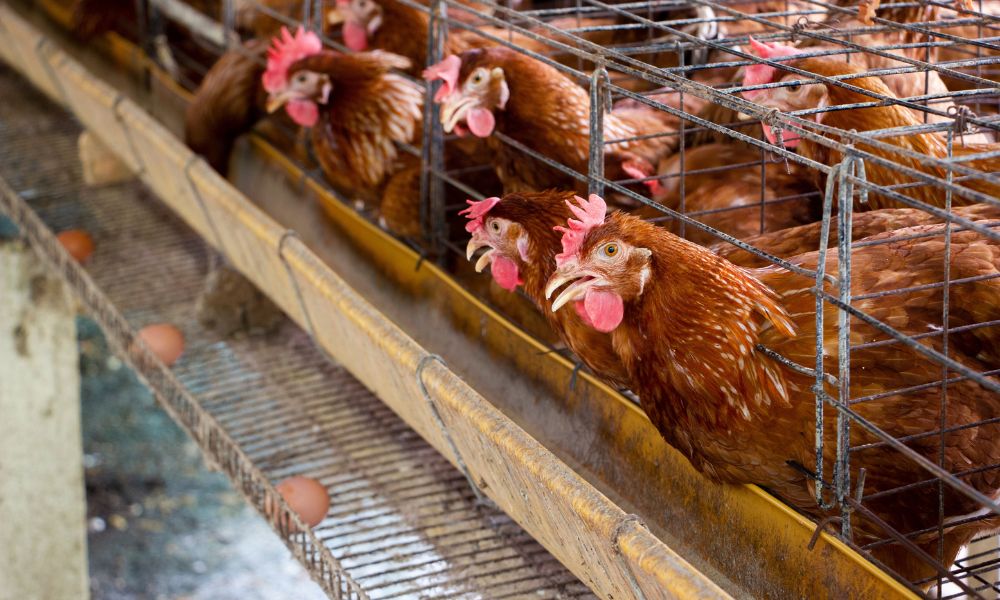A new federal civil rights complaint alleges that a state agency’s lack of oversight of intensive bird farms is endangering the health and well-being of the planet and North Carolina residents — and disproportionately those of color.
The complaint — submitted to the Environmental Protection Agency (EPA) by the Vermont Law and Graduate School’s Environmental Justice Clinic on behalf of two North Carolina residents and nonprofit Friends of Earth — focuses on dry litter poultry farms, which contain thousands of birds such as chickens and turkeys crammed into long barns.
Workers store the the birds’ litter — a combination of feces, urine, feathers, water, and sawdust —outside in up-to-8-foot-tall piles, which sit and “fume” until they get spread on land as fertilizer.
The operations are considered “deemed permitted” in North Carolina, meaning they don’t require approval or registration with the NC Department of Environmental Quality (DEQ) — nor are they subject to routine inspections to ensure that toxic runoff isn’t contaminating air, land, and water resources.
People cited in the complaint as living near the cruel industrialized farms said the piles attract flies and smell like “rotting meat” and “putrid death.” They also alleged that odors and pollution have led to decreased quality of life and increased human health risks, including for asthma, cancer, headaches, and birth defects.
Jefferson Currie II, a Lumbee tribal member who lives within a mile of 28 of the largely unregulated bird farms, said in a declaration in the complaint that the cruel farming has impacted his quality of life and those of the surrounding community.
“I’ve experienced the stench of poultry waste and the waves of flies that invade the homes and lives of the majority low-income and Black, Brown and Indigenous people in our communities,” he wrote. “These industrial animal operations are harmful to the health of our families and the waterways of the Lumber River.”
Lady Freethinker provided a copy of the EPA complaint to the DEQ along with a media inquiry. In their official response, the agency declined to comment, saying, “DEQ has not received a copy of the complaint from the petitioners or from EPA and cannot comment at this time.”
The agency added: “DEQ operates a robust nondiscrimination program that complies with EPA’s Title VI regulations and staff works with the DEQ’s Secretary’s Environmental Justice and Equity Advisory Board and communities directly to address concerns.”
Between 2018 and May 2023, DEQ received 37 complaints regarding dry litter poultry operations and issued notices of violations in 14 of those, the agency said.
Last year the state’s more than 4,000 poultry farms produced 1 billion birds, who in turn produced 2.5 billion pounds of manure, which contained pollutants including antibiotics, growth and sex hormones, and pesticides, according to the complaint.
More than 230,000 people lived within a half-mile of a farm, the distance that the odor from the manure can travel, according to an investigation by the Charlotte Observer and the Raleigh News & Observer.
The complaint requests that the EPA, which provides approximately 94 percent of the DEQ’s funding, investigate the state agency for violations and also require a comprehensive permitting system for dry litter poultry operations.
The EPA now has six months from the filing of the complaint to respond.
Lady Freethinker hopes the EPA will take this complaint seriously. In addition to the negative human health and environmental impacts from industrialized animal farming, numerous investigations have documented the cruelty to animals. Birds at poultry farms typically endure painful mutilations — including de-beakings and de-toeings — and often aren’t able to express the behaviors that are natural to them.
Remember that you can help be part of the shift to a more compassionate and environmentally-friendly world for all species by choosing plant-based options!







